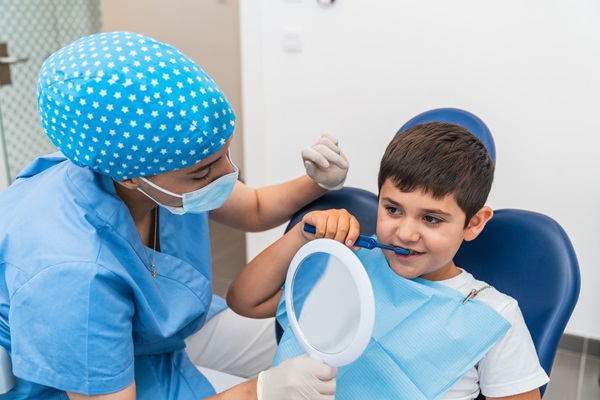How a Pediatric Dentist Does a Baby Root Canal

A baby root canal allows the dentist to save the child’s tooth. That way, it can stay in place until it is ready to come out. This is important because the baby teeth have several functions. You might be wondering how a baby root canal is performed. Read on to learn more about this type of tooth restorative procedure.
How a baby root canal is done
First, the dentist will numb the area. That way, the child will not have to feel any pain during the procedure. Next, a drill will be used in order to access the tooth’s canal. This allows the dentist to place tools into the root canal.
The dentist will use the tools to remove the infected pulp from the tooth’s chamber. Cleaning fluids might be used to help take out this diseased pulp. The child might have an X-ray taken then. This can help the dentist to see if there is any more pulp that needs to be removed.
After all of the tooth’s pulp has been removed, the dentist will use an antibacterial liquid. This will help to clean the root canal one last time. Then the dentist can dry out the root canal. The pediatric dentist will place a filling inside the root. In some cases, a steroid is placed in the root canal to prevent swelling. A crown will be used to protect the tooth after this.
After a root canal
The child might have some pain once the procedure has finished. This is even more likely to happen once the local anesthetic has worn off. Pain is a normal response. The child might have a pain medication or recommend one for the child to take.
The parent should ask the dentist when the child can drink and eat again. There might be some instructions for caring for the tooth after a baby root canal. For example, it may be wise to avoid brushing the area for the first night. If the child received a temporary crown, there might be a second appointment to apply the permanent crown.
Preparing a child for a root canal
This might seem like a scary procedure for a child. The good news is that parents can help calm the child’s fears beforehand. By explaining to the child what will happen, the parent can help the child understand it better. That way, the child will know what to expect. It is important to tell the child that there will be a medication that will help to minimize any pain.
Visit a dentist for a baby root canal
If your child has an infected tooth, a baby root canal may be the way to save it. Your child’s pediatric dentist can help you decide if a baby root canal is needed. Regular dental checkups are important for preventing decay. That way, the decay is less likely to reach the point where a root canal is needed.
Request an appointment here: https://www.cedarsmilesdentistry.com or call Cedar Smiles Pediatric Dentistry at (512) 808-5666 for an appointment in our Cedar Park office.
Check out what others are saying about our dental services on Yelp: Baby Root Canal in Cedar Park, TX.
Related Posts
A pulpotomy is a common pediatric dental procedure that treats decay or infection in the nerve of a baby tooth while preserving the healthy portion of the tooth. When a cavity reaches the nerve chamber, simple fillings no longer provide enough protection. A pulpotomy allows the pediatric dentist to remove the diseased portion of the…
Cavity treatment for kids is a common concern for many parents, as dental decay remains a prevalent childhood health issue. Early intervention and proper care are essential for maintaining healthy teeth and preventing future problems. Partnering with a pediatric dentist can take some of the guesswork out of promoting your child's oral health. To start…
Pediatric orthodontics is a specialized branch of pediatric dental care focused on the growth, development, and alignment of children's teeth and jaws. Pediatric orthodontics addresses dental irregularities when they first appear, promoting healthier oral structures and preventing more complex problems in adolescence and adulthood. Understanding the basics of pediatric orthodontics helps parents make informed decisions…
Kids dentists provide multiple services dedicated to preserving or improving your little ones' oral health. Poor oral health can cause a ripple effect in your kid's development. The teeth play an integral role in their functioning, from bone structure and speech to the digestive and respiratory systems. A kids dentist can help set the foundation…
